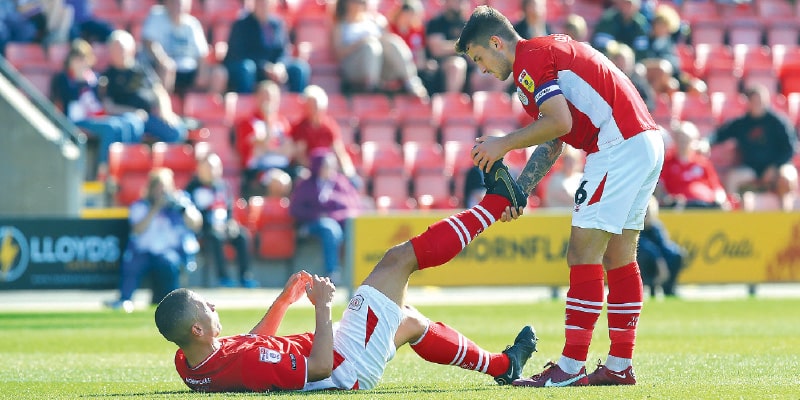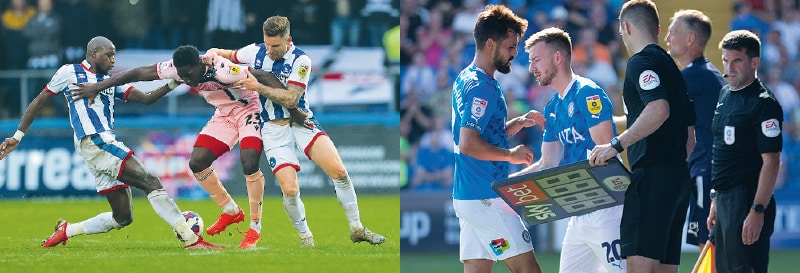
Rod McDonald goes down with cramp as Crewe Alexandra look to protect a 2-1 lead against Northampton Town. Getty Images
Battles of attrition and tedious timewasting in the lower leagues are increasingly a turn-off for supporters, whose entertainment is sacrificed for points
By Mark Hodkinson
12 December 2022
A League Two footballer looks much the same as his counterpart from the Premier League – lithe, muscular, dabs of peroxide in his hair and a neck or arm (sometimes both) sheathed in tattoos. The former, however, earns an average of £2,000 per week; the latter, £60,000.
To the uninitiated, this differential can seem both unfair and outlandish. They can all run and tackle and shoot, can’t they? So why do those at the top earn 30 times more? A visit to a match between lower league clubs will provide the answer. With only a handful of spirited exceptions, perhaps Forest Green Rovers last season and Leyton Orient this, it is routinely no-fun football.
The disparity of talent, top division to bottom, is manifest, of course, but the greater concern is that lower league players have become a homogenised whole. In acknowledgement of their inferior technique and vision, the compulsion has been to focus on athleticism, strength and bulk. Sides cancel each other out and games become exercises in attrition. Among all the running, pushing and shoving (often termed the press), there is literally no space for free-flowing, joyful football.
Players have realised that most matches invoke this weary stalemate and responded accordingly. Scoring chances are so few that should a team fluke upon a lead, they “bank it” resorting to anti-football to ensure the win does not become a draw or defeat. Fans accept this ploy in the last few minutes of a game but, down the leagues, it often comes into play as soon as a lead is taken, at whatever point in the match. Pundits and players have already named this nefarious strategy; take your pick from gamesmanship, game management, shithousery or, perhaps most apt, the Dark Arts.
These terms cover a range of deeds that despoil a game of football. On any given Saturday this will include feigning injury, refusing to retrieve the ball, delaying free-kicks and throw-ins, goalkeepers belly-flopping on the ball, substituted players slowly (very slowly) departing the field and players kicking the ball away when a free-kick is awarded against them – this has become endemic over the past two seasons.

A physical battle takes place between Hartlepool United and Grimsby Town; a late substitution for Stockport County as they lead Colchester United 1-0. Getty Images (2)
These constant, irritating stoppages are designed to suffocate a game and, most importantly, “waste” time. The premise is simple: the fewer number of minutes of open play, the less chance for the opposition to score a goal. Within the existing laws of the game this stratagem should fail magnificently, but these devious sleights are carried out largely with impunity.
It is hard to fathom why a blind eye is turned by referees and league officials, especially when the scourge is in plain sight. A player wastes time because he knows the added time will fall short of the true number, so his cheating is rewarded. The issue is easily eradicated. Independent time-keepers could be utilised or the stolen number of seconds and minutes doubled and played out at the end of the match – they’d soon retrieve the bloody ball, then.
During those rare passages of actual play, prevailing tactics have done little to increase the entertainment value. Whereas tiki-taka has been used by elite clubs to elude opponents with snappy, progressive passes, the lower league parody has seen the centre-back pass to the other centre-back, to the goalkeeper, to the deep-lying midfielder, to the centre-back, to the goalkeeper. Bored yet? If you’re not, try a stab of acute despondency instead, as that same centre-back is caught in possession and the ball gleefully thrashed into your team’s net.
Previously, players from higher echelons would finish their careers down the leagues, if only for the sheer love of playing. In recent years fear of injury in such a bear pit has deterred them, so there is no longer their sprinkling of guile and imagination. Instead the players, most of them Premier League academy cast-offs, appear to have been mono-coached, making the same runs and safe passes, usually sideways and backwards, because they have been taught no-risk, possession-based football is everything.
As it stands, it feels as if the whole community of football at the thick end of the professional pyramid – clubs, managers, players, referees and officials – are in cahoots in sanctioning this relentless, wretched fare. Eventually, all but the most partisan supporters will stay loyal, while the rest grow disillusioned by the endemic cynicism and move on. The talk will be of a lost generation of fans and those ground-out, deathly dull 1-0 wins against Gillingham, Crawley Town et al will have come at a huge cost.
This article first appeared in WSC 427, January 2023. Subscribers get free access to the complete WSC digital archive
Want to see your writing published in WSC? Take a look at our pitching guide and get in touch
Tags: League Two, Refereeing, Tactics, Timewasting
